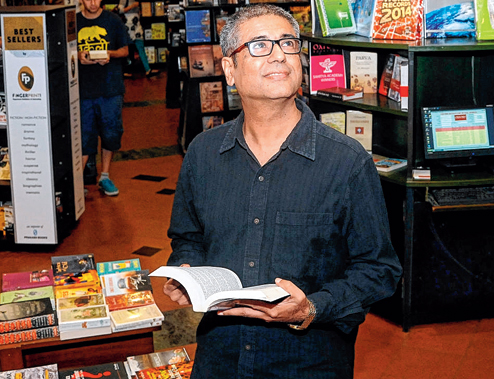 |
| Mahesh Dattani at Oxford Bookstore. Picture by Sayantan Ghosh |
He saw his own film after five years and pronounced it had room for improvement but was happy he made it anyway. That was playwright Mahesh Dattani speaking to a full house at Oxford Bookstore after a screening of Mango Souffle, one of India’s first gay films.
Dattani shared with the audience how with Mango Souffle he had taken his first “baby steps towards filmmaking” and how he faced problems both with the film and the play it was adapted from, On A Muggy Night in Mumbai.
The play, written in 1998, had not been received well by the LGBT community. “It was criticised for all the wrong reasons. But I followed my instinct and turned it into a film,” Dattani told Metro.
Reactions to the play are also dwelt on in an autobiographical essay by Dattani in his latest book, Me and My Plays (Penguin India, Rs 299). The book includes his latest play, The Big Fat City (performed for the first time in June last year) and Where Did I Leave My Purdah (performed first in October, 2012).
Dattani kept the audience at the launch of the book at Starmark, Quest mall, engaged with his tongue-in-cheek humour and storytelling on everything from limited audience attention to tales of controversy. The icing on the cake came when Dattani offered to read parts of Where Did I leave My Purdah, with the disclaimer that he was a bad actor. “It is a layered play. The challenge was in packing so much into 90 minutes,” he said.
“What’s objectionable about the term purdah?” the playwright asked the audience as he went on to share how “veil” spoilt its meaning. “A work’s title means a lot to a writer. It punches a lot of meaning,” he said, adding, on a lighter note: “The title (of my book) is vain, but my publishers were fine with it.”
At the screening of his film, Dattani shared tidbits about the censorship issue he faced with Mango Souffle before its release in 2002. The board initially had problems with a nude scene in a pool that had two men kissing. The 89-minute film is about the dilemma and hurt faced by a gay man who invites his friends to his farmhouse to sort out his emotional issues, but the gathering ends on a dramatic yet poignant note. A low-budget film, it was shot at the producer’s mango orchard. “Like apple, I wanted to turn mango into a fruit of temptation, hence the name,” explained Dattani.
A true theatre person, Dattani said he enjoyed staging a play more than making a film but confessed to appreciating his final products on screen more. “You can always improvise and improve a play, but when a film is done, it’s done.” He joked about being unhappy with both, like a true artist. “But the film has its moments.”











